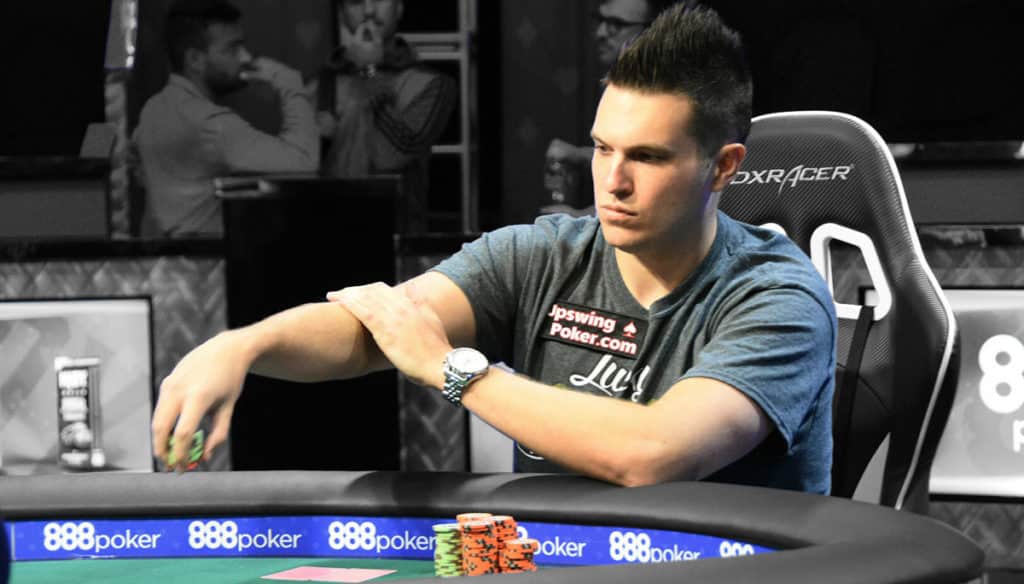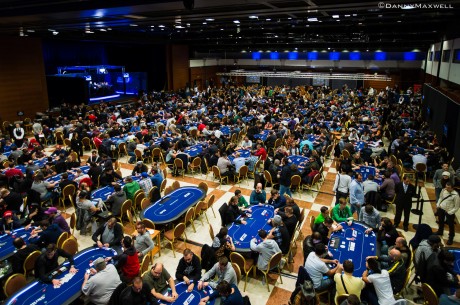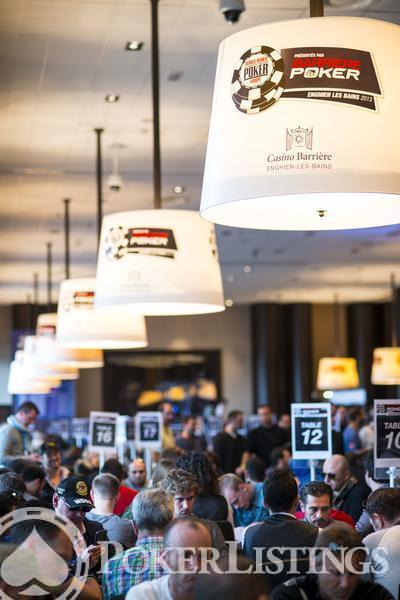One of the greatest challenges for a tournament player is being able to adapt to the changing settings of the tournament. The blinds are always increasing, antes may be added, your chip stack will fluctuate, and you will even be moved from table to table, so the players at your table will change.
- Early Poker Tournament Strategy Against
- Early Poker Tournament Strategy Game
- Early Poker Tournament Strategy Payout
- Early Poker Tournament Strategy Games
- Early Poker Tournament Strategy Rules
- Early Poker Tournament Strategy Bracket
- Early Poker Tournament Strategy 2019
Early Poker Tournament Strategy Against
MTT tournament strategy at an early stage implies a non-standard decision-making in order to get the maximum value. If there are a lot of aggressive players at your tables, then you should use a counter-strategy against them, thereby giving them an opportunity to grant you their chips. There are a few so-called 'standard' poker tournament moves you'll probably want to avoid during the early levels, among them preflop moves like three- and four-betting lightly or blind stealing. In this article we’ll cover the tight strategy for the early stages of tournament play from a pro-con perspective. It’s up to you to determine what approach fits best into your game, but hopefully the below will give you a starting point for analyzing whether or not tight really is right for you.
This article series will focus on adapting to the changing levels. That is, the increasing blinds and the addition of antes. We have articles about the early stages, the middle stages, the bubble, the late stages, and the final table. Each piece will help guide you all the way to a first place tournament finish.
This page will discuss the early stages of tournament poker, and how to adapt your play to the beginning of the tournament. Our definition of the 'early stage' of a tournament is the time period between the first hand of the tournament until about half of the tournament field is eliminated.
Blinds and Antes
In the early stage of a tournament, blinds and antes won't be a major concern. Since most tournaments provide players with a starting stack of 1,500 or 3,000 chips, and blinds usually start at 10/20 (no antes), each player has anywhere from 75 to 100 big blinds. This is more than enough to play with normal poker strategy, so during the early stages you shouldn't worry about stealing blinds or antes to survive.
Aggression During the Early Stages
During the early stages of a poker tournament you should use a pretty mellow approach, because too much aggression during the early stages of a tournament usually leads to an early exit. Since blinds are so small in relation to your stack size, we recommend seeing a lot of cheap flops and looking for a spot to double up. There is no reason to get all your chips in the middle unless you are at least an 80% favorite. Avoid coin flips, because you will find better spots to use your chips later in the tournament.
We recommend playing a lot of marginal hands in late position, especially if you can get in cheap. For example, if you have KJ on the button and someone makes a raise to 3x the big blind, you should call behind and try to flop a big hand. This strategy only works if you are able to release hands though, because often times you will be out-kicked with marginal hands if you make top pair. You should be looking to hit two pair, trips, or a straight - these are the hands that will win you big pots, because other players will have a hard time getting off top pair or an over pair.
By seeing a lot of cheap flops from late position, you give yourself a great chance to hit a flop and double up while only risking a small portion of your chip stack. And by avoiding preflop all-in coin flips you will give yourself a better chance of survival, and will save chips for use later in the tournament.
Other Players' Aggression
As stated before, many players will have the mentality to get all-in on coin flips preflop. These players want to build a large stack early in the game, and if they are eliminated they have no problem with it. You can take advantage of these players' aggressiveness by doubling up when you have a huge hand. Remember though, don't shove all your chips in the middle with any two cards. If a player is playing very aggressively, call his all-in with Queens, Kings, Aces, or Ace-King, because those hands have 95% of his range dominated.
Overplaying Too Soon
Many players tend to involve themselves in pots with marginal hands early in the tournament. At this stage in the tournament overplaying hands such as AK or small pocket pairs will relieve you of a majority of you stack. At later stages in the tournament, continuation bets on flops and turns can steal the pot after a pre-flop raise. But because the aggression of opponents is so high early on, continuation bets are not as effective.
If you are holding a marginal hand like AK or 77 on a flop of 10-J-6 with a couple suited cards, a continuation bet may be very dangerous. Odds are your opponent has outdrawn you with a weak hand such as A10 or Q10. However, this early in the tournament a player will be much more willing to call your C-bet. So although you may think your opponent is on a draw, he may be willing to call you down to the river with these weak hands.
Now that you know about the early stages, read on about the middle stages of a poker tournament.
More General Poker Tournament Strategy:
Unfortunately, a complete poker tournament strategy cannot realistically be broken down into just ten steps, simply because so much information goes into a complete tournament strategy. However, that doesn't mean that a top ten list can't be useful - in fact, the reality is quite the opposite.
This top ten list can be digested in a few minutes, and will transform amateur tournament players into educated players who will have a much better shot at winning a big tournament score.
Ok, enough fluff - let's get right into our top ten tips for No Limit Hold'em tournament players:

Tournament Tip #1 - Play Tight in the Early Stages
The small blinds in the early stages of poker tournaments tempt many players to play a loose game. Don’t let yourself fall into the same trap. The early stage of a poker tournament is full of loose players. All you have to do is sit tight and wait for strong hands. Besides, you don’t want to waste your chips on marginal hands early in the tournament; you’ll be needing those chips later.

Tournament Tip #2 - Increase Your Aggression as the Blinds Increase
The higher the blinds get, the more you need to steal them to stay alive. Unless you are lucky enough to win a few giant pots, you’ll spend most of your time in a tournament short stacked and worried about the next blind increase. The bigger the blinds go, the more you need to steal them.
As the bubble approaches, you should increase your aggression even more to take advantage of the players just trying to sneak in to the money. Right before the money, you’ll notice many players tighten up. They are just trying to survive long enough to make it to the money. These players represent a perfect opportunity for you to steal the blinds and pad your stack.
Tournament Tip #3 - Keep a Healthy Tournament Bankroll
If you want to minimize the chances of you ever going broke, a tournament bankroll of at least 50 buy ins is recommended. This means that if you have a $1,000 bankroll, the most expensive tournaments you should play in are $20. Tournament players have to have a huge bankroll because big wins don’t come often. The large bankroll gives you enough breathing room to survive those long draughts between wins.
Tournament Tip #4 - Drawing Hands Have Less Value
As a tournament wears on, the players will have increasingly small stacks in comparison to the blinds. Small drawing hands like suited connectors and small pairs lose value because your average opponent is so short stacked. If you spend a lot of money prospecting with such hands, you won’t get paid off with large enough pots to cover the expenses.
Tournament Tip #5 - It Requires a Stronger Hand to Call than to Go All-In

David Sklansky calls this the “Gap Concept.” The idea is that you don’t have to have as strong a hand to push all-in as you do to make a big call. When you push all-in, you have the advantage of aggression and therefore have two ways to win the pot: by having the best hand or by making your opponent fold. When you call, you can only win the pot if you have the best hand at the showdown.
Early Poker Tournament Strategy Game
Remember this tip when it gets down towards the end of a tournament and the pressure is high on everyone to collect chips. You’ll do better if you collect chips by pushing all-in rather than by making big all-in calls.

Tournament Tip #6 - Steal From the Middle-Stacks
You’ll have better luck by stealing from the players with average sized stacks than by stealing from large stacks or small stacks. The players with large stacks aren’t afraid to make those calls because they have the chips to lose. The short stacked players will call your steals out of desperation.
The players with medium stacks aren’t yet desperate enough to make wild calls but they don’t have enough chips to make loose calls. These players are the most likely to fold to your steals. Attack these players as often as you can get away with it.
Early Poker Tournament Strategy Payout
Tournament Tip #7 - Improve Your End Game Skills by Playing Sit N Gos
Players who play multi-table tournaments have a tough time getting practice in end-game scenarios like the final table and heads up play. Sit N Go tournaments (SNGs) are the perfect place to practice your skills. You’ll start out in a situation similar to the final table and then get the opportunity to play in shorthanded situations as the players knock each other out. You might even win a little money while you’re at it.
Early Poker Tournament Strategy Games
Tournament Tip #8 - Take Notes
Always pay attention to your opponents and take notes. Not only will you learn useful things about their tendencies, but you’ll also keep your head in the game. Plus, you would be surprised at how often you see the same players in different tournaments. Those notes will come in handy time and again.
Tournament Tip #9 - Think About Position
Early Poker Tournament Strategy Rules
Position is vital in poker tournaments because it represent a major knowledge advantage. When you act in late position, you get to see what your opponents do before you act. You can get away with playing weaker hands in late position thanks to that advantage. In early position, you need all the help you can get so you should stick with cards that are inherently strong.
Tournament Tip #10 - Play to Win
Early Poker Tournament Strategy Bracket
Your tournament results will vastly improve if you play to win rather than to make it to the money. For example, if you build up a decent chip stack early, don’t squander it by sitting tight and waiting for the bubble to break. Keep the pressure up and keep on building your stack.
The payouts for tournaments are heavily skewed to favor the players who reach the final table. If you play just to make it to the money, you’ll cash more often but for small amounts. If you play for the 1st place finish, you will be knocked out more often but the occasional massive score will more than make up for the times you go out early.